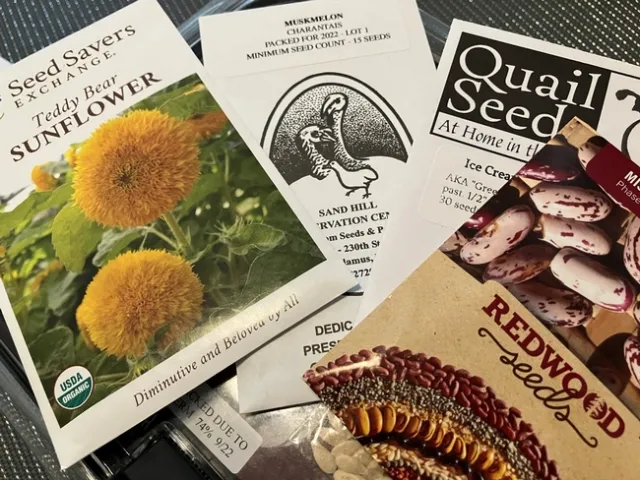
Since the pandemic, the price of seeds has gone way up. This increase is across the board, and in some cases it's no different than the higher prices for our groceries and shirts and sneakers and most other things we buy. But unlike other price increases, the higher cost of seeds isn't nearly as obvious as it is egregious.
Since I took up heirloom vegetable gardening, I've been hyperaware of how much work goes into producing heirloom seeds. I've never discounted their value from small producers and even mid-size companies.
However, it's hard for me to swallow paying more for a pack of seeds that two years ago contained double and even triple the number of seeds. Free shipping doesn't make up the difference when you pay more for far, far fewer seeds.
Maybe this reflects the reality of our priorities as home gardeners. Who really has room for 25 melon plants from 25 seeds that two years ago was the minimum in each packet? Maybe 10 plants from 10 seeds—the amount that I've seen as the minimum in 2024—are enough. But should the size of my garden have anything to do with what I pay for seeds?
If free shipping is a seed company's main selling point, I keep my hand on my wallet while I take a closer look to see exactly what I'm buying.
A case in point with tomato seeds
It never hurts to shop around. Let's take the case of one of my very favorite tomato varieties, ‘Brad's Atomic Grape,' which was developed by Brad Gates of Wild Boar Farms. Brad sells the seeds for this variety and so many other wonderful varieties he developed on his own website for $4.99 for 15-25 seeds.
Here is the range of pricing for ‘Brad's Atomic Grape' from a few other companies on 1/24/24:
- $3.25 for 25 seeds, Redwood Seeds
- $3.95 for ~20 seeds, Victory Seeds
- $4.75 for ~60 seeds, San Diego Seed Company
- $3.00 for 10 seeds, Tradewinds Fruit
To make this decision even more complicated, we have to remember that comparing seeds for sale isn't always like comparing apples to apples. Some companies contract with farmers to produce seeds that they then buy in large quanties to package and resell. Others produce all the seeds themselves, on their own farms.
Paying more makes sense for the right seeds
There are times when I will happily pay more for the right seeds, whether or not there's free shipping. For example, last year I planted the tomato variety ‘Perfection in Pink' as part of a home gardening trial through SeedLinked. This variety was developed by Wild Mountain Seeds from a mutation of ‘Red Ruby.' Having planted both varieties, I can say that ‘Perfection' is special.
Soon after the trial, I found packets of ‘Perfection' seed online for $15. Experimental Farm Network, which I will always support, still offers packets of ~20 seeds for $15, but now Wild Mountain offers their packets of ~20 seeds for $6.
In both cases, I would pay that much for those seeds. The high cost probably reflects all the breeders put into producing this outstanding variety and making it available to me.
But there's a lot of trust and assumption in that point of view. I only know those people through a single, though wonderful, variety of tomato they produced. In this case, that experience and a fair amount of reading up on Google and Reddit are enough for me.
Support the producer to keep the good seeds coming
When I buy heirloom seeds, I always spend a little time to know exactly what I'm getting—and who I'm supporting.
At a mushroom festival near Mount Shasta last year, I was lucky to meet Kalan Redwood, the owner of Redwood Seeds. She challenged me to identify the seeds in an array of glass jars, and to her amazement I nailed every one except, oddly, onions. Kalan grows out her own seeds in a California climate similar to my own but with much shorter summers. Her seeds have done well in my garden.
I love getting udpates from the Native Seeds Search farm. That small company has fantastic heirloom and indigenous varieties of corn, melons, squash and beans that no one else makes available. We should all be planting, growing out and enjoying the fruits of their seeds.
Seed Savers Exchange is an institution that more than wins my support each spring for everything they do in addition to selling seeds. As it happens, in January they offered free shipping. I bought a bunch.
Wild Boar Farms sells all their own varieties, so with ‘Brad's Atomic,' whatever the cost of the seeds or shipping, I'll always buy directly from them. I'm planting at least five other Wild Boar varieties this year.
So while I don't want to feel like I'm getting ripped off buying seeds, I don't want this worry to punish the people that truly do make my world brighter. A small seed company is work, and I don't think a single person takes the risk to start and run one without a deep passion for what we all do. Because they do this, we all, individually, don't have to.
If we want to have nice things, we have to support the people who make them. It's important to do this even when—maybe especially when—the cost is higher.

